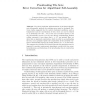Free Online Productivity Tools
i2Speak
i2Symbol
i2OCR
iTex2Img
iWeb2Print
iWeb2Shot
i2Type
iPdf2Split
iPdf2Merge
i2Bopomofo
i2Arabic
i2Style
i2Image
i2PDF
iLatex2Rtf
Sci2ools
117
click to vote
DNA
2003
Springer
2003
Springer
Proofreading Tile Sets: Error Correction for Algorithmic Self-Assembly
Abstract. For robust molecular implementation of tile-based algorithmic self-assembly, methods for reducing errors must be developed. Previous studies suggested that by control of physical conditions, such as temperature and the concentration of tiles, errors (ε) can be reduced to an arbitrarily low rate – but at the cost of reduced speed (r) for the self-assembly process. For tile sets directly implementing blocked cellular automata, it was shown that r ≈ βε2 was optimal. Here, we show that an improved construction, which we refer to as proofreading tile sets, can in principle exploit the cooperativity of tile assembly reactions to dramatically improve the scaling behavior to r ≈ βε and better. This suggests that existing DNA-based molecular tile approaches may be improved to produce macroscopic algorithmic crystals with few errors. Generalizations and limitations of the proofreading tile set construction are discussed.
Related Content
| Added | 06 Jul 2010 |
| Updated | 06 Jul 2010 |
| Type | Conference |
| Year | 2003 |
| Where | DNA |
| Authors | Erik Winfree, Renat Bekbolatov |
Comments (0)

